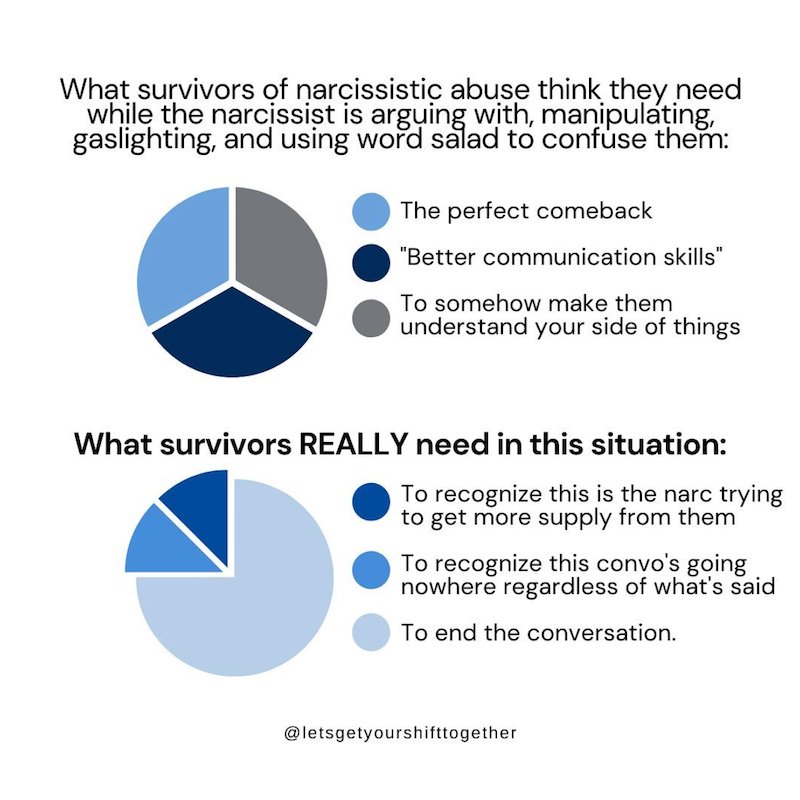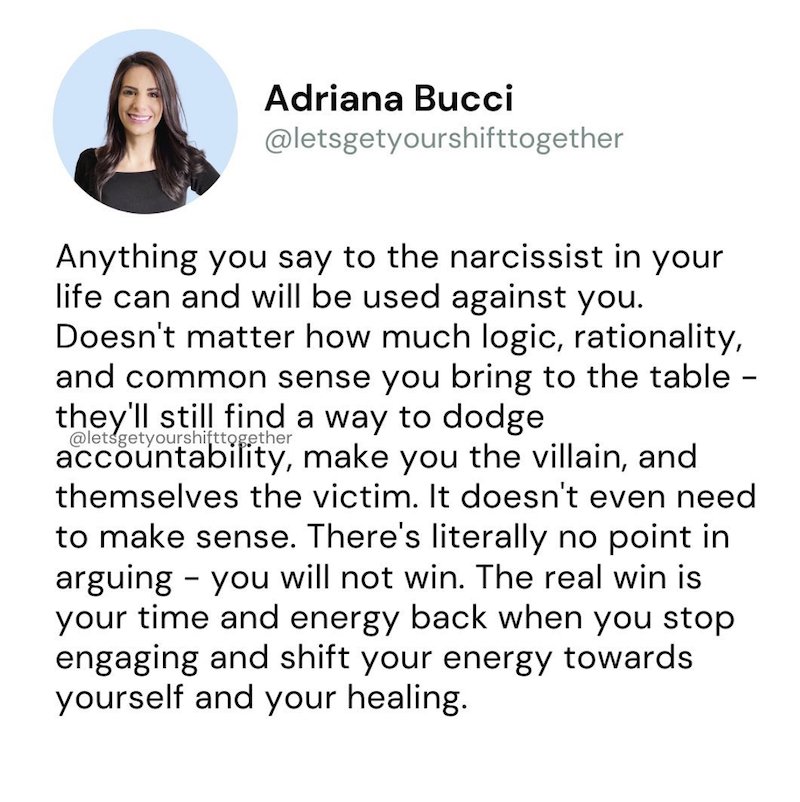How To Win An Argument With A Narcissist
by Audie Metcalf
First, a disclaimer. Not one person admits to being a narcissist. So one of you reading this, is one. Or maybe I’m one. Because it’s logically impossible that ALL of us feel like we know a narcissist and yet NO ONE accepts the responsibility of actually being one.
Why is that, I wonder?
Moving on.
Second disclaimer. You don’t ever really “win” anything with a narcissist. There’s no, like, compromise. There’s no “hearing you out.” There’s no…listening. This is from a profound and constant lack of empathy on their part. You only figure out how to strategize the conflict so that you can get your needs met. Narcissists also lack something called “object constancy” which essentially means when they’re angry, they’re unable to hold two feelings at once. If they’re consumed with anger that’s all they’re able to process. They’re not, in the moment, also remembering that maybe you’re the mother of their child, that your intentions are good. That’s usually caused by complex trauma as a child which you can read more about HERE.
So. To be clear. An argument with a true narcissist is sort of pointless if your goal is to get them to understand your point of view. It just won’t happen. Oh, and by the way, I’m not a therapist or an expert. I’m just a person who has interacted with a lot of narcissists. So I pretend I’m an expert. And I use these phrases and tricks that make these interactions less destructive. Let’s begin.
1. Remember Your Goal
This is a simple way of saying: you’re only talking with them for a specific outcome. That’s it. You can’t really engage or convince them to see your side of things or expect any sort of typical “relational” behavior where they’re able to understand where you’re coming from. So you have to go into it expecting this and remembering the only reason you’re engaging is simply to get a specific outcome.
This is key information because that means you’re essentially having the fight because you NEED that goal to happen. For example, maybe your ex-spouse is a narcissist and you have to work out the details of your custody days. Or your mother is a narcissist and you need to negotiate family scheduling and grandkid details. You are not going to deeply and emotionally share your side and have them finally, magically hear it. They can’t. Know your goal and work towards it. That’s it.
2. Don’t Take The Bait
A true narc will likely trot out the darkest, saddest parts of your life, and weaponize them against you, to get an emotional reaction. If you confided to them that you felt unloved as a child, they will use it against you in a heated moment. This is deeply unfair and destructive and nearly paralyzing when it happens. It’s hideous and unforgivable and abusive, and no one should be subjected to such treatment, nor do we deserve it, and I want to make it exceedingly clear that none of this is remotely acceptable.
But, if you’re in a position where you have to deal with such things, or you’ve made the choice to manage a relationship with a narcissist for whatever reason, it’s crucial for your self-esteem that you remember this kind of behavior is not about you being all the terrible things they say you are. It is a function of the disorder. And even if you’re nodding your head right now, you and I both know that separating their insults from our perception of ourselves is easier said than done.
It’s hugely helpful to remember that any time they’re hurling ugly words and attacks your way, it’s from a place of deep, deep powerlessness, and pathetic name-calling is their only weapon. If you can switch things in your mind to remember this, you’ll be able to reframe things a bit more easily in the moment. Or at least, after the moment is over and you’re trying to gather yourself back together.
3. Always Use “We” Not “You”
“You” is an accusation, thereby making their heads explode, because narcissists feel fundamentally threatened by nearly everything.
For example:
“You have been late with child pick-ups every weekend for the last few weeks. That’s starting to feel like you don’t respect our arrangement or my time. Please be on time next week.”
Their heads will explode and they will start to attack you even though you’re just being clear and direct.
So try this:
“Traffic has been a nightmare lately hasn’t it? Do you feel like we have a good situation with the timing for pick-ups right now, or do we need to push it to be later to accommodate when we’re running behind? You tell me.”
It feels like you’re not being direct. It feels like you’re acquiescing to their unfair, disrespectful bullshit. It feels like the opposite of everything we’ve been taught to stand up for ourselves to have clear and concise boundaries. Yes. It feels like that. But they are a different breed and unless you wind things around to get what you want, they will see your “need” and attack it.
4. Don’t Overexplain
Keep your communication extremely simple, dry, and without much reasoning. There’s more info HERE about something called the “grey rock method” that addresses this in more detail.
If you use explanations they need to be for a specific purpose of meeting your goal. They can’t be to try and make the narcissist understand your feelings. It’s just not going to happen. And holding onto that hope is so often what keeps us in this agitated state of always feeling like some “aha” moment, where they recognize their behavior, is just around the corner. And it just isn’t. There’s no corner. There’s just more of the same.
Set sail to that hope and focus on yourself, your needs, your child. You’ll never get a true apology which is one that’s accompanied by change. Never.
So. Whether you’re dealing with a narcissist in your life currently, or if you’ve found your way out, the goal above all, is to forgive. Not them. Forgive yourself.
It’s easy to find ourselves in spirals of questions about how we could have ever chosen such a hideous person to have a child with, and it must mean something awful and weak about us. Or if we allowed our parents to treat us poorly with no boundaries for so long. But these are just the artifacts of their behavior.
Much of these behaviors are abusive. And so the ideal choice for anyone who has abusive people in their lives is to remove themselves if possible. But sometimes it’s not possible. Like if you want a relationship with your parents despite them being narcissists, and therefore you need to navigate holidays or trips or how they deal with your kids. Or if you have to maintain a relationship with your child’s parent for the sake of your child’s well-being. And I just don’t think it’s always realistic to tell people to end the relationship.
So, we manage it. The best we can.
Audie Metcalf is the Editor-in-chief of The Candidly, and lives in LA with her family. You can find more of her articles here.














